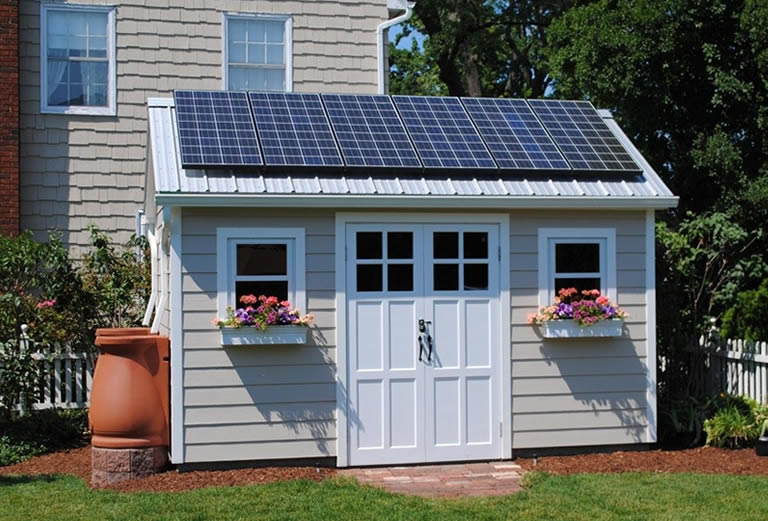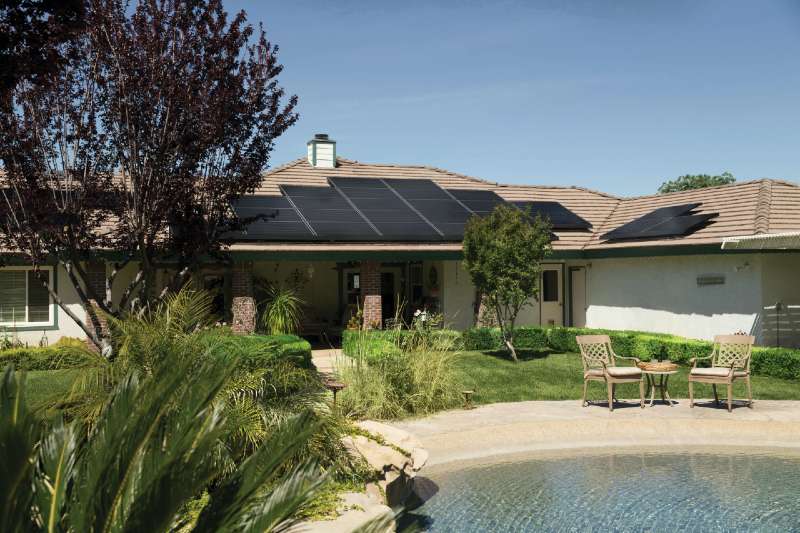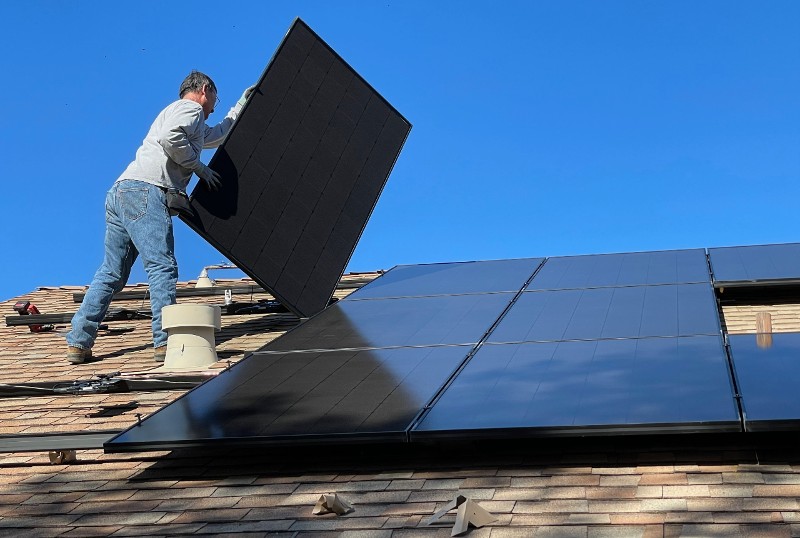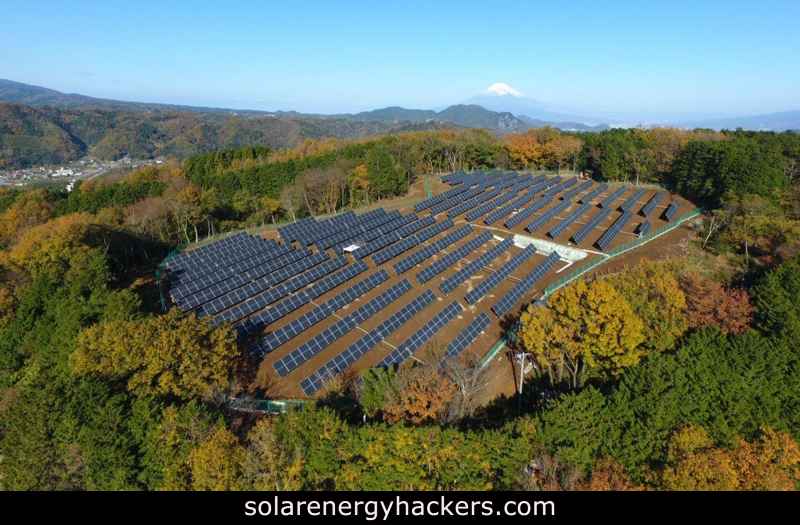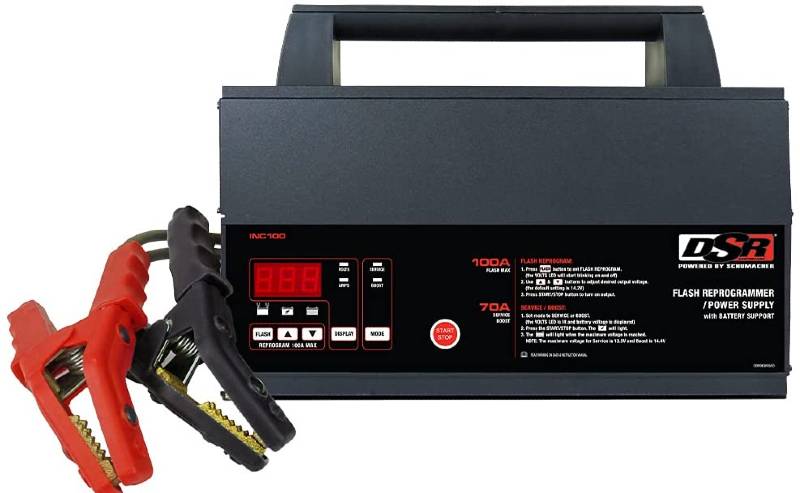What do you think solar panels weigh?
Does 30 pounds sound about right?
Well, think again because it turns out that solar panels are much heavier than you might think.
A typical residential solar panel weighs about 42 pounds, while commercial solar panels weigh about 50 pounds, give or take a few.
Obviously, this is just the average weight, and depending on the size and type of solar panel you’re looking at, it may weigh much more or less than these numbers.
If you’re interested in learning more about the different weight and size variations of solar panels, then you are just in the right place.
In this article, we will go through how big are solar panels, what affects their size & weight, and whether your roof can handle the extra weight.
So without further ado, let’s get started!
Key Takeaways
- Residential solar panels are 65″ by 39″ on average and weigh about 42 pounds.
- Residential solar panels’ surface area is 17.6ft² on average.
- Commercial solar panels are 78″ by 40″ on average and weigh about 50 pounds.
- Commercial solar panels’ surface area is 21.6ft² on average
- The solar cells themselves only weigh 5% of the solar panel’s total weight.
- The glass cover makes up about 77% of the panel’s weight.
- Solar panels impose a load of 3-4 lbs/ft² on your roof.
- Your roof can handle at least 20 lbs/ft² load.
How Big Is A Solar Panel?
Most residential solar panels are around 65 inches (165cm) by 39 inches (99cm) and weigh roughly 42 pounds (19kg), while commercial panels can be much larger, at 78 inches (198cm) by 40 inches (110cm) and weighing around 50 pounds (22.7kg).
Both residential and commercial solar panels have similar thicknesses of around 1.4 inches (3.5cm) and are made of a glass surface on the front and a polymer backing that protects the cells.
To help you understand how solar panels vary in size and weight, we put together the following table with some key stats:
| Solar Panels Wattage | Length (mm) | Width (mm) | Height (mm) | Weight (lbs) |
|---|---|---|---|---|
| 100W | 1195 | 545 | 35 | 19.8 |
| 200W | 1530 | 680 | 35 | 26.5 |
| 250W | 1559 | 798 | 35 | 33 |
| 300W | 1640 | 990 | 35 | 40 |
| 350W | 1956 | 990 | 40 | 44 |
| 370W | 1820.2 | 1106 | 40 | 47 |
| 400W | 2050 | 1050 | 40 | 48.4 |
| 450W | 1903 | 1134 | 40 | 53 |
| 500W | 2073 | 1133 | 40 | 57.3 |
| 550W | 2278 | 1133 | 40 | 62.8 |
Note: These sizes are for average-sized solar panels, but there are also smaller and larger solar panels available on the market.
What Is The Surface Area of a Solar Panel?
The surface area of a solar panel is typically around 17.6 square foot for residential panels and 21.6 square foot for commercial panels.
While most solar panels vary in length and width, they typically have a pretty similar surface area to make it easier for installers to hook them up in rows.
What Affects Solar Panel Size?
The actual size of the solar panel depends on numerous factors such as the solar cell type, the solar cell efficiency, the number of cells in the panel (wattage), the brand, and many more.
In this section, you’ll discover some of these factors and how they affect the size of solar panels.
1. Solar Cell Type
Right now, there are 3 types of solar cells:
- Monocrystalline: This solar cell is made from a single crystal of silicon, which gives it a uniform shape and color. It’s the most efficient type of solar cells, but they are also the most expensive, as they require more time and energy to manufacture.
- Polycrystalline: Similar to the monocrystalline cells, this one is also made of a silicon crystal but instead of a single pure crystal, it is made of multiple small silicon crystals. This is a cheaper version of the monocrystalline cell, but it is also less efficient and has a grainier appearance.
- Thin film: Unlike silicon solar cells (mono and poly), thin film cells aren’t made of silicon crystals. They are made by depositing thin layers of various photovoltaic materials on a substrate, such as Amorphous Silicon (a-Si), cadmium telluride (CdTe), and copper indium gallium diselenide (CIGS). They are the least efficient type of solar cells, but they are also the cheapest.
The type of solar cell used in the panel is one of the main factors that affect its size.
For example, mono cells are far more efficient than thin film, typically twice as much.
This means that a mono solar panel will be smaller than a thin film one, even if they both have the same wattage rating.
2. Solar Cell Efficiency
Solar panel efficiency is defined by how much of the solar radiation is converted into usable electrical energy.
So if a solar cell received 1,000W of solar energy and it produced 230Wh of electricity, then it would have an efficiency of 23% (230W/1,000W = 0.23).
Now, solar cells have different conversion efficiencies, depending on how pure they are and the technology used to make them.
For example, most monocrystalline solar cells have an efficiency between 15% and 24%, while thin film solar cells typically have an efficiency between 7% and 18%.
The higher the solar cell’s efficiency, the smaller the solar panel size because it requires fewer cells to generate the same amount of power.
3. Number Of Cells In The Solar Panel (Solar Panel Wattage)
The size of the solar panel also depends on its rated power or watts.
In other words, how much electricity can this solar panel produce.
Solar panels are available in many different wattage ratings from as low as 10 watts to over 400 watts.
Most residential solar panels have 48-70 solar cells, while commercial panels can have up to 156 cells (half-cut or 1/3 cut cells).
As a general rule, the higher the solar panel wattage, the more cells it’ll have, and the larger it will be.
4. The Brand
Like everything commodity in today’s free market, solar panels come from different manufacturers and vary in quality.
Most solar manufacturers try to keep solar panel sizes similar for easier installation.
For example, you’ll notice that most solar panels, residential and commercial, have a similar width of roughly 39 inches.
The length, however, can vary a lot, depending on the solar cell technology and the number of cells in each module.
How Much Do Solar Panels Weigh?
Most residential solar panels weigh between 35 and 45 pounds each with an average of 42 pounds (19kg).
Commercial solar panels, on the other hand, weigh about 50 pounds (22.7kg) each.
While commercial solar panels are much bigger than residential ones, they actually have a pretty similar weight per-square-foot ratio of approximately 2.5 lbs/ft² (12kg/m²).
What Makes Solar Panels So Heavy?
Surprisingly, the solar cells themselves only weigh 5% (2.1 pounds or 1kg) of the solar panel’s total weight.
What really affects the panel’s weight is the tempered glass sheet (77%) and the aluminum or steel frame (9%).
This actually makes sense, as solar panels are designed to withstand extreme weather conditions, such as wind speeds up to 140 miles per hour, hail up to 1 inch in diameter falling at 50 miles per hour, and snow loads up to 5,400 pascal or 112 pounds per square inch.
So a glass that can handle that kind of abuse must be pretty heavy.
Also, this is why the weight of solar panels can vary a lot, even if they have similar wattage, as some panels are just more durable for extreme conditions than others.
How Much Weight Do Solar Panels Add to a Roof?
If you are reading this article, chances are you don’t really care about the weight of a solar panel. You just want to know whether your roof can support the weight of a whole solar panel system or not.
The good news is that most roofs can easily support the weight of solar panels.
Don’t trust me?
Ok, let’s crunch some numbers.
The average weight of a residential solar panel is 42 pounds (18kg) with an average surface area of 17.6ft² (1.64m²).
This means that a residential solar panel weighs roughly 2.4 lbs/ft² or 12kg/m².
With the mounting hardware, wires, and other components, the total weight of the solar panels will be 3-4 pounds per square foot.
Now, can your roof support a load of 3-4 pounds per square foot (14.6-19.5kg/m²)?
Yes, it can!
Building codes in the USA and most other countries require that your roof be able to support a snow load of at least 20lbs/ft² (97.65kg/m²) for 4:12 pitched roofs (about 18.4-degree angle).
In other words, you can put 5 solar panels on top of each other before you reach your roof’s snow load limit!
So, to answer your question, yes, most “healthy” roofs can support the weight of solar panels.
The keyword here is healthy, so if your roof is old, damaged, or too thin to support this weight, then you should consider a different option.
Anyways, don’t worry about it.
Part of the solar installation process is site assessment, where a solar installer comes to your home and makes sure that your roof can support the solar panels.
And even if your roof can’t handle the new weight, you can still opt for a ground mounted solar panel system or even build a solar pergola.
What Is the Ideal Solar Panel Efficiency?
Most commercially available solar panels today have an efficiency of between 15-24%, so 20% ideally you want to get a solar panel with an efficiency of at least 20%.
But the higher the efficiency, the more expensive the solar panel gets, so you need to find a balance between price and efficiency.
FAQs
How Heavy Is the Solar Panel?
A solar panel weighs roughly 42 pounds or 19 kilograms.
What Is the Weight of 1 KW Solar Panel?
A 1kw solar panel system consists weighs about 126 pounds or 57 kilograms.
How Heavy Is a 72 Cell Solar Panel?
A 72 cell solar panel weighs roughly 50 pounds or 22.7 kilograms.
This weight varies depending on the manufacturer and the type of solar cell technology used in the panel.
How Heavy Is a 100 Watt Solar Panel?
A 100 watt solar panel weighs 19.8 pounds or 9 kilograms.
How Heavy Is a 200 Watt Solar Panel?
A 200 watt solar panel weighs 26.5 pounds or 11.5 kilograms.
How Much Does a 300 Watt Solar Panel Weigh?
A 300 watt solar panel weighs 40 pounds or 18 kilograms.
How Much Does a 350 Watt Solar Panel Weigh?
A 350 watt solar panel weighs 44 pounds or 20 kilograms.
How Much Does a 370 Watt Solar Panel Weigh?
A 370 watt solar panel weighs 47 pounds or 21.5 kilograms.
How Much Does a 400W Solar Panel Weigh?
A 400 watt solar panel weighs 48.4 pounds or 22 kilograms.
How Much Does a 450 Watt Solar Panel Weigh?
A 450 watt solar panel weighs 53 pounds or 24 kilograms.
How Heavy Is a 500 Watt Solar Panel?
A 500 watt solar panel weighs 57.3 pounds or 26 kilograms.
How Heavy Is a 550 Watt Solar Panel?
A 500 watt solar panel weighs 62.8 pounds or 28.5 kilograms.
Last Words
If you are thinking about installing solar panels on your home, it’s important to understand how much extra weight they add to your roof.
While most roofs can easily support this additional weight, some may not be able to.
This is why it’s important to work with a trusted and experienced solar installer who will perform a site assessment before proceeding with the installation.


